SB 239063
Synonym(s):trans-1-(4-Hydroxycyclohexyl)-4-(4-fluorophenyl)-5-(2-methoxypyridimidin-4-yl)imidazole;trans-1-(4-Hydroxycyclohexyl)-4-(4-fluorophenyl)-5-(2-methoxypyrimidin-4-yl)imidazole, p38 MAP Kinase Inhibitor XV;SB 239063 - CAS 798558-40-4 - Calbiochem
- CAS NO.:193551-21-2
- Empirical Formula: C20H21FN4O2
- Molecular Weight: 368.4
- MDL number: MFCD03792786
- SAFETY DATA SHEET (SDS)
- Update Date: 2024-11-17 16:00:36
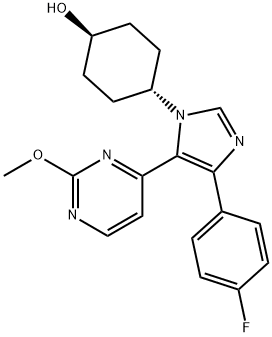
What is SB 239063?
The Uses of SB 239063
SB 239063 has been used to determine the roles of c-Jun N-terminal kinase (JNK), p38 MAP kinase, and extracellular signal regulated protein kinase (ERK)/p42/p44 mitogen activated protein kinase (MAPK) on the viability and apoptosis of cardiomyocytes under glutathione S-transferase (GST) inhibition. It has also been used in neuron-microglia conditioned media (CM) experiments and pharmacokinetics.
The Uses of SB 239063
SB239063 is neuroprotective, decreases the number of activated microglia and facilitates neurogenesis in oxygen-glucose-deprived hippocampal slice cultures. A protein kinase inhibitor
What are the applications of Application
SB 239063 is an inhibitor of p38 MAP kinase
Definition
ChEBI: A member of the class of imidazoles carrying 4-hydroxycyclohexyl, 4-fluorophenyl and 2-methoxypyrimidin-4-yl substituents at positions 1, 4 and 5 respectively.
General Description
SB 239063 helps to decrease neutrophilia, inflammatory cytokines, matrix metallopeptidase 9 (MMP-9) and fibrosis in the lung.
Hazard
A poison by ingestion.
Biological Activity
Potent and selective p38 MAP kinase inhibitor (IC 50 = 44 nM for p38a). Displays > 220-fold selectivity over ERK, JNK1 and other kinases; ~ 3-fold more selective than SB 203580 (4-[5-(4-Fluorophenyl)-2-[4-(methylsulfonyl)phenyl]-1H-i midazol-4-yl]pyridine and 4-[5-(4-Fluorophenyl)-2-[4-(methylsulphonyl)phenyl]-1H- imidazol-4-yl]pyridine hydrochloride ). Reduces inflammatory cytokine production and is neuroprotective following oral administration in vivo .
Biochem/physiol Actions
Potent p38 MAP kinase inhibitor. Selective for α and β. No activity against γ and δ isoforms.
in vitro
in oxygen-glucose-deprived hippocampal slice cultures, treatment with 20 μm and 100 μm sb239063 significantly reduced the levels of the pro-inflammatory cytokine il-1β and reduced cell death after oxygen-glucose deprivation and strikingly diminished microglia activation[2].
in vivo
oral administration of 3–30 mg/kg sb 239063 given twice a day dose-dependently inhibited airway neutrophil infiltration and interleukin (il)-6 levels 48 h after lipopolysaccharide (lps) inhalation [1]. in a bleomycin-induced pulmonary fibrosis model rats, sb 239063 treatment (2.4 or 4.8 mg/day via osmotic pump) significantly inhibited bleomycin-induced right ventricular hypertrophy (indicative of secondary pulmonary hypertension) and increased in lung hydroxyproline synthesis (indicative of collagen synthesis and fibrosis) (1). in conscious guinea pigs, administration of sb 239063 (10 or 30 mg/kg p.o.) showed approximately 50% inhibition of oa-induced pulmonary eosinophil influx, measured by bal 24 h after antigen(1). orally administration of sb 239063 (30 mg/kg) attenuated il-6 bronchoalveolar lavage fluid concentrations (> 90% inhibition) and mmp-9 activity (64% inhibition) measured 6 h after lps exposure. in guinea pig cultured alveolar macrophages, sb 239063 inhibited lps-induced il-6 production with ic50 of 362 nm. in lipopolysaccharide-stimulated human peripheral blood monocytes, sb 239063 inhibited il-1 and tnf-α production with an ic50 of 0.12 and 0.35 μm, respectively(1).
storage
Desiccate at +4°C
References
[1] underwood d c, osborn r r, bochnowicz s, et al. sb 239063, a p38 mapk inhibitor, reduces neutrophilia, inflammatory cytokines, mmp-9, and fibrosis in lung[j]. american journal of physiology-lung cellular and molecular physiology, 2000, 279(5): l895-l902.
[2] strassburger m, braun h, reymann k g. anti-inflammatory treatment with the p38 mitogen-activated protein kinase inhibitor sb239063 is neuroprotective, decreases the number of activated microglia and facilitates neurogenesis in oxygen–glucose-deprived hippocampal slice cultures[j]. european journal of pharmacology, 2008, 592(1): 55-61.
Properties of SB 239063
| Melting point: | 206-207.2 °C |
| storage temp. | 2-8°C |
| solubility | DMSO: 11 mg/mL |
| form | White solid |
| color | white |
Safety information for SB 239063
| Signal word | Warning |
| Pictogram(s) |
 Exclamation Mark Irritant GHS07 |
| GHS Hazard Statements |
H302:Acute toxicity,oral H315:Skin corrosion/irritation H319:Serious eye damage/eye irritation H335:Specific target organ toxicity, single exposure;Respiratory tract irritation |
| Precautionary Statement Codes |
P261:Avoid breathing dust/fume/gas/mist/vapours/spray. P264:Wash hands thoroughly after handling. P264:Wash skin thouroughly after handling. P270:Do not eat, drink or smoke when using this product. P271:Use only outdoors or in a well-ventilated area. P280:Wear protective gloves/protective clothing/eye protection/face protection. P330:Rinse mouth. P362:Take off contaminated clothing and wash before reuse. P301+P312:IF SWALLOWED: call a POISON CENTER or doctor/physician IF you feel unwell. P302+P352:IF ON SKIN: wash with plenty of soap and water. P304+P340:IF INHALED: Remove victim to fresh air and Keep at rest in a position comfortable for breathing. P305+P351+P338:IF IN EYES: Rinse cautiously with water for several minutes. Remove contact lenses, if present and easy to do. Continuerinsing. P332+P313:IF SKIN irritation occurs: Get medical advice/attention. P337+P313:IF eye irritation persists: Get medical advice/attention. P405:Store locked up. P403+P233:Store in a well-ventilated place. Keep container tightly closed. P501:Dispose of contents/container to..… |
Computed Descriptors for SB 239063
| InChIKey | ZQUSFAUAYSEREK-WKILWMFISA-N |
New Products
4-Fluorophenylacetic acid 4-Methylphenylacetic acid N-Boc-D-alaninol N-BOC-D/L-ALANINOL Tert-butyl bis(2-chloroethyl)carbamate 3-Morpholino-1-(4-nitrophenyl)-5,6-dihydropyridin- 2(1H)-one Furan-2,5-Dicarboxylic Acid Tropic acid S-2-CHLORO PROPIONIC ACID ETHYL ISOCYANOACETATE 2-Bromo-1,3-Bis(Dimethylamino)Trimethinium Hexafluorophosphate (6-METHYL-[1,3]DITHIOLO[4,5-b]QUINOXALIN-2-ONE INDAZOLE-3-CARBOXYLIC ACID 4-IODO BENZOIC ACID (2-Hydroxyphenyl)acetonitrile 4-Bromopyrazole 5,6-Dimethoxyindanone 2-(Cyanocyclohexyl)acetic acid 4-methoxy-3,5-dinitropyridine 2-aminopropyl benzoate hydrochloride 1-(4-(aminomethyl)benzyl)urea hydrochloride diethyl 2-(2-((tertbutoxycarbonyl)amino) ethyl)malonate tert-butyl 4- (ureidomethyl)benzylcarbamate Ethyl-2-chloro((4-methoxyphenyl)hydrazono)acetateRelated products of tetrahydrofuran
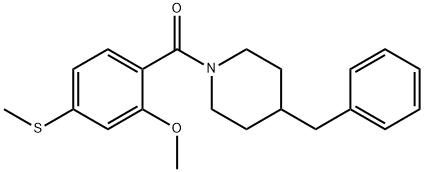
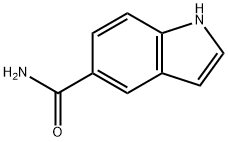
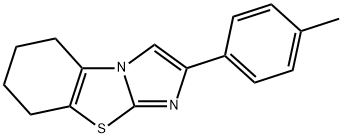
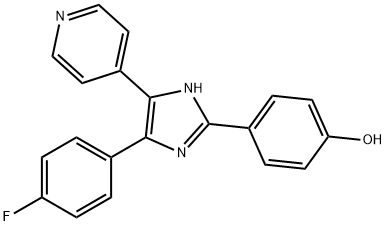
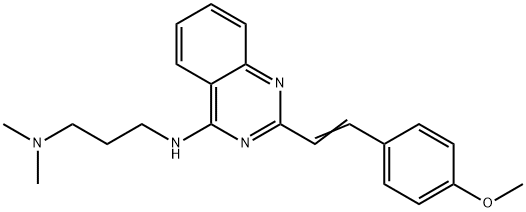

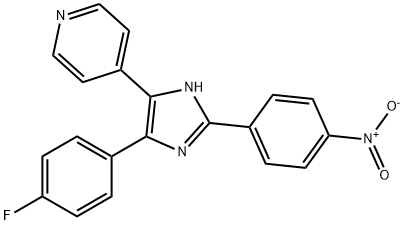
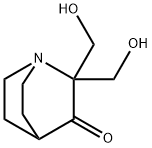
You may like
-
 SB 239063 CAS 193551-21-2View Details
SB 239063 CAS 193551-21-2View Details
193551-21-2 -
 SB 239063 CAS 193551-21-2View Details
SB 239063 CAS 193551-21-2View Details
193551-21-2 -
 1975-50-4 98%View Details
1975-50-4 98%View Details
1975-50-4 -
 2-HYDROXY BENZYL ALCOHOL 98%View Details
2-HYDROXY BENZYL ALCOHOL 98%View Details
90-01-7 -
 2-Chloro-1,3-Bis(Dimethylamino)Trimethinium Hexafluorophosphate 221615-75-4 98%View Details
2-Chloro-1,3-Bis(Dimethylamino)Trimethinium Hexafluorophosphate 221615-75-4 98%View Details
221615-75-4 -
 61397-56-6 CIS BROMO BENZOATE 98%View Details
61397-56-6 CIS BROMO BENZOATE 98%View Details
61397-56-6 -
 14714-50-2 (2-Hydroxyphenyl)acetonitrile 98+View Details
14714-50-2 (2-Hydroxyphenyl)acetonitrile 98+View Details
14714-50-2 -
 118753-70-1 98+View Details
118753-70-1 98+View Details
118753-70-1